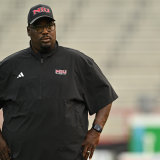
College Football Playoff 2022 prediction: Why the No. 1 Georgia Bulldogs will win back-to-back titles
Kirby Smart is seeking a second straight national championship in the seventh season leading his alma mater

No. 1 Georgia begins its defense of the College Football Playoff National Championship on Saturday as the Bulldogs take on No. 4 Ohio State in a semifinal showdown at the Peach Bowl in Atlanta. The clash with the Buckeyes will mark the Bulldogs' third game inside Mercedes-Benz Stadium this season as the venue has become the program's unofficial home away from home during its rise to national prominence under seventh-year coach Kirby Smart.
At 13-0, Georgia has held the No. 1 position in the AP Top 25 for 13 of the past 14 editions of the poll, and have been atop the CFP Rankings since dethroning then-No. 1 Tennessee on Nov. 5 with an impressive 27-13 victory over the high-flying Volunteers. The Bulldogs have a Heisman Trophy finalist at quarterback in Stetson Bennett, a stable of great running backs, the nation's most-dynamic tight end in Brock Bowers and a defense that has barely missed a beat despite losing five first-round NFL Draft picks from last season.
But can they repeat as national champions against a field that includes the Buckeyes, unbeaten No. 2 Michigan and a plucky TCU squad ranked No. 3? The answer is a clear and emphatic yes.
With a diverse range of strengths and few obvious weaknesses, Georgia is the most complete team in the field. It's also an experienced squad that has thrived in key situations while methodically marching toward a second straight national title. If Georgia wins it all, it will become the first program since Alabama in 2010-11 to repeat as national champion.
Here is why Georgia can complete the repeat mission in this year's College Football Playoff.
1. Georgia is incredibly versatile
What sets Georgia apart from the other teams in the CFP field is its versatility. The Bulldogs have three running backs who have surpassed 500 yards rushing with each averaging more than 5 yards per carry and scoring at least six touchdowns. While Georgia does not have a clearly established elite perimeter threat at wide receiver like Ohio State, the Bulldogs have one the nation's most-diverse passing attacks and arguably the best tight end in Bowers.
Bowers and fellow tight end Darnell Washington have combined for 78 receptions while lining up all over the field in offensive coordinator Todd Monken's system. Running backs Kenny McIntosh, Daijun Edwards and Kendall Milton have totaled 51 combined receptions. Top wide receiver Ladd McConkey has 51 catches and lines up both out wide and in the slot. You never know who Bennett is going to target or where they'll be lined up. The Bulldogs also integrate pre-snap motion into 49.3% of their plays and run 15.8% of their snaps from under center; both of those figures rank on the high end nationally.
Though you can critique Georgia for its relative lack of deep threats, this offense is incredibly diverse and difficult for opponents to prepare for because of how many different looks it can throw at you. The Bulldogs also showed comfort winning in a variety of ways. In a season-opening 49-3 beatdown of Oregon, that meant throwing 37 times and running just 25 times against the Ducks' weak secondary. In a 16-6 win at Kentucky on Nov. 19, the Bulldogs threw the football just 19 times and ran it 46 times while letting their elite defense do the heavy lifting. If one facet of the game is not clicking for Georgia, the Bulldogs are well-rounded enough to find something that will work and execute it at an elite level.
2. Bulldogs boast experience edge
As reigning national champion, Georgia's experience sets it apart from the field. Just a year ago, the Bulldogs triumphed in this exact spot, and many of the players from that team contributed to the program capturing its first national title since 1980.
Georgia has won 31 of its past 32 games, and its only loss in that stretch came last season against an Alabama team that the Bulldogs turned around and beat for the national title a few weeks later. This program has been through everything college football has to offer and conquered it. While many key players from last season's squad moved on, there is continuity in key positions on the coaching staff and on the field, particularly on offense with players like Bennett, McConkey and Bowers.
Michigan played in a CFP semifinal game last season and Ohio State reached the CFP National Championship Game two seasons ago. TCU is, of course, a first-time participant in the playoff. While there are some players and coaches for the Wolverines and Buckeyes with CFP experience, it's not as extensive or impactful as the experience the Bulldogs gained last season in an Orange Bowl dismantling of the Wolverines and subsequent championship game win over the Crimson Tide.
3. Dawgs thrive in key situations
A fair critique of Georgia would be that the Bulldogs have little experience in close games. Aside from a 26-22 victory at Missouri on Oct. 1, every game Georgia has played was a double-digit victory. But within the story of each game, the Bulldogs have been sound in clutch situations -- even if they've rarely come with a game's outcome hanging in the balance.
Georgia ranks No. 5 in third-down conversion percentage at 51.6% and No. 2 in fourth-down conversion percentage at 84.6%. Additionally, the Bulldogs are No. 1 nationally in red-zone scoring percentage at 97.2%. While the they have settled for 21 field goals in the red zone, the Bulldogs have never turned the football over in the red zone. They are the only CFP team, and one of just 14 teams nationally, who can make that claim.
Defensively, they are just as solid in the same situations. Georgia ranks third nationally in third-down defense, allowing opponents to convert just 26.7% of the time. The Bulldogs are No. 16 in fourth-down defense at 38.7% and absolutely stingy on defense in the red zone. Opponents have scored touchdowns on just 32.1% of their trips to the red zone against Georgia this season, which ranks No. 1 nationally by a wide margin. By comparison, Ohio State allows touchdowns on 60.9% of opponents' red-zone trips.
Making a CFP case for ... No. 2 Michigan | No. 3 TCU | No. 4 Ohio State


















